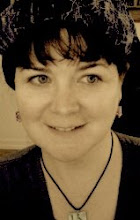This letter is on blue stationery that bears a poem and sketch printed on the front side. The title of the poem is "Woman's Love," and the sketch is of a bride (or at least, a young woman in a veil). Here's the verse:
Oh! not when hopes are brightestThe poem isn't credited, but a quick google finds it's by Scottish poet and abolitionist Thomas Pringle (1789-1834), and frequently appeared in anthologies of sentimental poems, under various titles including "Love" and "The Natural Effects of Love." (Pringle was also disabled from a childhood accident, and used crutches through his life, a detail which Marion may or may not have known.) Some enterprising soul printed Pringle's words onto bridal stationery, and Marion chose that stationery for this letter to her departed friend.
Is Love's enchantment known.
Oh! not when hearts are lightest
Is woman's fervour shown;
But when life's clouds o'ertake us,
And earth is clothed in gloom--
When summer friends forsake us--
Then Love is best in bloom.
Love is no wandering vapour
That lures with treacherous spark,
Love is no transient taper
That lives and leaves us dark;
But, like the lamp that lightens
The hut beneath the snow,
The bosom's home it brightens
When all is chill below.
The Bogg
June 26th 1872
Dear Friend
I received your very welcome letter on the 22nd of June. I hope when this reaches you that you will be safe landed and all right. you said in your letter that you expected a letter from me before you left home, and you would have written to me before you left home, if you did not get a letter from me before the one you got with the paper you ought to have got one, for I wrote by return of post to you in answer to the first letter I got from you after you left here. However I hope you will get this one all right.
I was sorry to see by your letter that your Father was so poorly it would be harder on you both to part by Jemmie we are not sure of a day whither we part in health of sickness and what is God's will we must submit to it although we may feel our natures hard to bend when we are first tried.
many a time I have felt how hard my nature is to bend when I feel how often my mind rebels against what I know to be my duity, no doubt but you would think me a very foolish girl that day you left me but my mind has been so much set on America for a long time that willingly I could have gone with you I only wish I had a guide like you to take me over, if ever I am there as I expect to be if spared and well, altho you are on the water when I am writting this I often wish I had been with you.
I have had no company since you left some days I sit for two or three hours and never see a face and I think you may guess where my thoughts is when I am so much alone I am wearing very much to get a letter from Marion but if she has not wrote before you land surely you will tell her how much I weary to hear from her and you must be sure to write as soon as you can if spared to land and let me know how you have got on with the things you took away and how Marion is pleased with them I only wish I had been along with you to [page ends]
